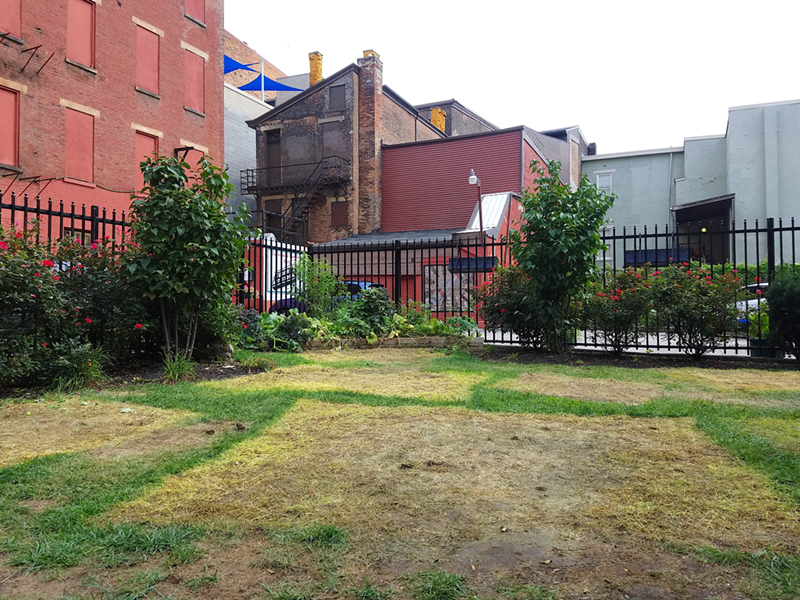The tents came down quickly. By noon, there were just a few large squares of faded grass and bare earth left behind at 13th and Republic streets in Over-the-Rhine to remind passersby that just a few hours prior, there had been a camp there.
While the tent cities are gone, the legal fight around them lives on, and many who stayed in the camps aren't sure where to go next.
A few of the roughly 15 people who had been living at the camp they call "The Colony" have found housing — Desmond Brown, who has been living in various camps for months, now has an apartment in Walnut Hills. Stacia Hollander, another camp resident, has a place in Westwood.
Others were at a loss as they packed up their belongings. Jessica Barnett sat next to her tightly rolled-up tent, a couple plastic bags, a backpack and a rolling suitcase. She's been trying for weeks, via various programs, to find housing. So far, things have not lined up.
"I'm just going to start walking with my backpack and my suitcase," she said. "I guess where I fall asleep is where I fall asleep, and if they arrest me, they arrest me."
A handful of other camp residents will go to shelters, and others still will do as Barnett will, walking until they find places that are out of plain sight so as to avoid potential arrest.
Hours prior to the camp's clearing, media and a contingent of advocates for people experiencing homelessness awaited the results of a hearing in the courtroom of Hamilton County Judge Robert Ruehlman. That hearing never came, however. Due to a complicated series of legal maneuvers, the county was basically suing the city to compel it to enforce an earlier ruling from Ruehlman outlawing the camps, which had popped up under Fort Washington Way, along Third Street, near the Lytle Tunnel, across from the Jack Casino in Pendleton and on Gilbert Avenue before coming to OTR. But the city asked Hamilton County Prosecutor Joe Deters to seek that order from Ruehlman, so there was no need for a hearing when the city agreed to enforce a ruling it effectively asked for in the first place.
Because the case was between the city and the county, the residents of the camps were not parties to them and did not have standing to present arguments before the court.
""The city should be fighting this on behalf of us, and they haven't," Greater Cincinnati Coalition for the Homeless Director Josh Spring said. "It's really unfortunate. It's like throwing the game."
Ruehlman's ruling Aug. 20 made the ban on camps within Hamilton County permanent. That ban originally applied only to camps on public property, as the previous tent cities were. But the city and county argue that the private land the 13th Street camp sat on does not have running water or bathroom facilities and is thus not fit for human habitation.
Deters and Cincinnati Mayor John Cranley have argued that the camps pose public health and safety risks, including drug use, public urination, hepatitis outbreaks and other hazards. Advocates for the camps, however, point out that the county has never presented evidence to support those claims.
"Because the encampment moved onto private property, a premises which is completely lacking the public health and safety requirements that are required by Ohio law, this court's injunctive powers to prevent the nuisance cause by the encampments are still applicable," the city and county's request for Ruehlman's injunction reads.
The legal moves by the city and county have caused concern from some legal analysts. Attorney and Cleveland State University assistant professor Joseph Mead says that those efforts represent an overreach. Mead and other lawyers sent a letter to Hamilton County earlier this week requesting that records around the court proceedings be made public.
"Even if you think arresting people for seeking shelter in a tent is a good policy, you gotta be a little troubled that policy is being made, not through the political process, but through a collusive lawsuit attempting to restrict rights of people who have no chance to weigh in," Mead wrote in a tweet.
"Through this two-week-long litigation, which had absolutely no adversarial testing, meaningful briefing, or any public input, Hamilton County may become one of the most aggressively anti-homeless places in the United States. An affront to democratic and constitutional values," he continued in another tweet.
Homeless Coalition Director Spring said that advocates and their attorney, Bennett Allen, will continue to pursue a federal lawsuit against the city. They feel "very confident," Spring says, that they will prevail on the federal level on constitutional due process, free speech and other grounds. He and other advocates argue that Ruehlman's rulings effectively create city law without Cincinnati City Council's involvement, make homelessness illegal and may violate the terms of a settlement reached a decade and a half ago between the city and advocates that required 72-hour notice be given before the city could clear someone out of a camp.
Spring says the coalitions' aim isn't to keep people living in the camps — a charge critics have leveled against the group — it's to prevent the city from moving them out of sight without doing substantive work to meet their needs. Spring says member organizations of the coalition have been working to get as many people as possible into shelters or housing for months, securing one or the other for about 50 people since controversy around the original tent city under Fort Washington Way blew up earlier this summer.
After a long game of chess between the city and the camps, Deters ordered the OTR camp on 13th Street removed by law enforcement on Aug. 16. But camp residents and representatives from advocacy groups like the Homeless Coalition huddled prior to Deters' deadline at the Jimmy Heath House nearby, debating a strategy. The plan they came up with: leave the space by Aug. 20 in order to spare the land's owners, Over-the-Rhine Community Housing, further controversy. The city indicated it would back off of enforcing the camp ban until that day.
Mary Burke Rivers, the executive director of the housing nonprofit that owns the land, called the camp on 13th “unsustainable” and said the organization and others are working on finding solutions. That would mean getting more camp inhabitants like Brown and Hollander housing. She noted, however, that it will be a daunting task.
Nonprofit Strategies to End Homelessness, which coordinates shelters and programs to move people into permanent housing, counted more than 7,100 Cincinnatians who experienced homelessness at some point last year. Advocates like the Greater Cincinnati Homeless Coalition, Over-the-Rhine Community Housing, Strategies to End Homelessness and others say that affordable housing is the way to address the issue. Though shelters in the area are full or over capacity, they have made room to accommodate those in the camps, according to Strategies to End Homelessness CEO Kevin Finn.
Hamilton County needs tens of thousands of units of affordable housing to meet demand from those making under $14,000 a year, according to a study by the Greater Cincinnati Local Initiatives Support Corporation. And, even as more people need affordable housing options locally and nationally, federal funding for housing is headed in the opposite direction. Over-the-Rhine Community Housing lost more than $1 million in federal funding for housing last year. Strategies to End Homelessness, which coordinates shelters and supportive housing options, lost another $300,000.
"This is going to keep happening, because we don't have enough of the solution," Rivers said of the tent cities.
Others, including former camp resident Leon "Bison" Evans, vowed to keep advocating for those who had lived at 13th Street and other locations.
"This isn't close to over," he said.






